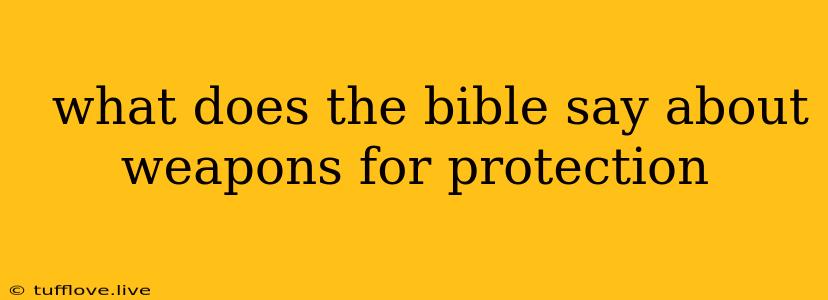The question of whether or not it is permissible to use weapons for personal protection is a complex one, with varying interpretations across different Christian denominations and individuals. While the Bible does not explicitly endorse or condemn the use of weapons for self-defense, it provides various passages that can be interpreted to offer guidance on the matter. This article will explore different biblical perspectives on the topic of weapons for protection, examining both the passages that advocate for non-violence and those that seem to suggest the legitimacy of using force in certain situations.
Biblical Passages on Non-Violence
The Bible contains numerous verses that promote peace, forgiveness, and non-violence. These passages often serve as the foundation for pacifist interpretations regarding the use of weapons.
The Sermon on the Mount
One of the most prominent examples is found in the Sermon on the Mount, where Jesus instructs his followers to "turn the other cheek" (Matthew 5:39) and to love their enemies (Matthew 5:44). These teachings suggest that Christians should refrain from using violence, even in the face of aggression.
The Teachings of Jesus
Throughout his ministry, Jesus consistently emphasized the importance of love, forgiveness, and non-violent resistance. He declared that "blessed are the peacemakers, for they will be called children of God" (Matthew 5:9). This emphasis on peacemaking further reinforces the idea that violence is contrary to the teachings of Christ.
The Book of Romans
The Apostle Paul, in his letter to the Romans, wrote, "Do not repay anyone evil for evil. Be careful to do what is right in the eyes of everyone." (Romans 12:17). This passage emphasizes the importance of responding to evil with good, reinforcing the concept of non-violence as a Christian virtue.
Biblical Passages on Self-Defense
While the Bible clearly advocates for peace and forgiveness, it also recognizes the reality of violence and the need for self-preservation. Some passages suggest that it is permissible to use force in certain situations, particularly when defending oneself or others.
The Old Testament
The Old Testament contains several examples of individuals using weapons for self-defense, including the stories of Samson, David, and the Israelites in battle. These narratives demonstrate that the use of force, even in a violent context, was not necessarily condemned in the Old Testament.
The Right to Self-Defense
The Bible recognizes the inherent right to self-defense. In Exodus 22:2, it states: "If a thief is caught breaking in and is struck and killed, there will be no bloodguilt." This passage suggests that using force to protect one's property is justified.
The Case of the Good Samaritan
While not directly related to weapons, the parable of the Good Samaritan (Luke 10:25-37) can be interpreted as supporting the idea of intervening to help those in need, even if it requires some form of defense. The Samaritan, who risked his own safety to help the injured man, exemplifies the importance of compassion and potentially the need to take action against evil.
Navigating the Complexities
The biblical passages on weapons for protection present a nuanced picture, emphasizing both the importance of peace and the right to self-preservation. While the Bible does not explicitly endorse the use of weapons, it acknowledges the reality of violence and the need to defend oneself in certain situations.
Ultimately, the decision of whether or not to use weapons for personal protection is a complex one that involves individual conscience, personal circumstances, and a deep understanding of biblical teachings. Christians must carefully weigh the different perspectives, seeking guidance from their faith leaders and making informed decisions based on their own convictions and the specific circumstances they face.
Conclusion
The Bible's teachings on weapons for protection are not straightforward. While it strongly advocates for peace, forgiveness, and non-violence, it also recognizes the reality of violence and the right to self-defense. The decision of whether or not to use weapons is a personal one that requires careful consideration of individual conscience, circumstances, and a thorough understanding of biblical principles. By examining both the pro-peace and self-defense passages, Christians can gain valuable insights into the ethical complexities surrounding the use of weapons and strive to live out their faith in a way that aligns with their beliefs and values.
